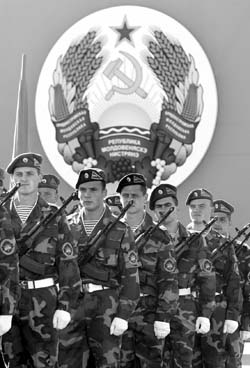Referendum as blackmail, or why Transdnistria cannot follow Montenegro’s example

Last week Sukhumi was host to a low-key meeting of the leaders of three unrecognized post-Soviet republics: Abkhazia, South Ossetia, and Transdnistria. The mass media ignored this “summit” of the self-proclaimed countries. Still, this is ample proof of a grave crisis in the settlement of “frozen conflicts.”
Transdnistria had promised to hold an independence referendum even before this event, but international organizations immediately said that there were no legal grounds for it. Will this influence Tiraspol’s stand? Will it be possible to put the ongoing negotiations, in which Ukraine is also participating, on a constructive footing? This was the subject of the international roundtable debate “The Impact of Cross-Border Cooperation between Ukraine, Moldova, and the EU on the Transdnistrian Settlement,” held recently in Kyiv.
The restoration of customs control by Ukraine on the Transdnistrian border sparked numerous protests in Tiraspol as well as among Russian politicians and some pro-Russian parties in Ukraine. Although tensions have eased now, the Transdnistrian settlement is still in a deadlock. Ukraine insists that it has taken some positive steps in the customs question. For example, Andriy Veselovsky, Deputy Foreign Minister of Ukraine and Ukraine’s special representative to the Transdnistrian settlement, says there is considerable progress in cross-border cooperation, owing to the efforts of the EU Border Assistance Mission to Moldova and Ukraine.
The European community has long stopped calling this sector of the border a “black hole.” There have been no serious instances of weapons or goods smuggling in the past few months, the deputy minister pointed out. At the same time, National Security and Defense Council representative Andriy Sobolev emphasized that by introducing a new customs regime, Ukraine has lost hundreds of millions of dollars. This is why, in his view, our country needs help from the EU and other interested parties.
Still, cross-border cooperation can in no way resolve the Transdnistrian settlement problem. Transdnistrian leaders recently announced their intention to hold a referendum on the secession of the Transdnistrian Moldavian Republic (PMR) from Moldova and even to adopt the Russian ruble as its local currency. Transdnistria’s leaders refer to the recent referendum in Montenegro, where most of the population voted for withdrawing from the federal state of Serbia and Montenegro.
This comparison is indefensible, said Adriaan Jacovits de Szeged, Special EU Representative for Moldova. According to the diplomat, Transdnistria cannot take this step because, unlike Montenegro, it was never part of a federal state. Under the joint constitution, Podgorica had the right to secede from Belgrade. Tiraspol does not have this right, so nobody will recognize a referendum if Transdnistria still chooses to hold one, the EU representative stressed. At the same time, he proposed nine steps that he believes will help resolve the Transdnistrian crisis.
The first is the introduction of a common customs policy. The Transdnistrians must be shown the advantages of working in a common customs space, including access to the EU market, Jacobovits de Szeged noted. In his view, the EU should have a summit-level dialogue with Moscow to settle the Transdnistrian conflict. Moscow should be persuaded to pull out its soldiers, weapons, and ammunition from Transdnistria (a pledge that Russia was supposed to fulfill several years ago).
Furthermore, Moscow must be persuaded that ethnic Russians will feel at home in a united Moldova. This cannot be achieved with threats, trade wars or the creation of economic problems for Moldova, the EU official says. In his opinion, the next step in resolving this frozen conflict is to democratize Transdnistria. In this context, the PMR authorities should allow the OSCE to assess the level of democracy in the breakaway republic and see if it can hold a fair and free election.
Some of the nine steps are aimed at maintaining security and monitoring enterprises that manufacture weapons and ammunition. The EU believes that Chisinau and Tiraspol should continue their dialogue on the division of powers. The mechanism of peacekeeping operations also needs to be transformed. In particular, Russian peacekeeping forces should be replaced by multinational units in which none of the countries will enjoy an advantage.
Natalia Belitser, an expert from the Pylyp Orlyk Institute of Democracy, notes that the democratization of Transdnistria is the most essential element of the new plan, but doubts that this intention will be put into practice.
“How can you democratize an enormous stratum of Transdnistrians who, experts think, are still in the grip of Soviet mentality?” the expert asks rhetorically. Oazu Nantoi, director of the Institute of Social Policies of Moldova, says that “treating a disease needs a correct diagnosis.” He believes that the Transdnistrian regime has managed to be viable and stable in the past 15 years because of three main factors: “Russia’s geopolitical interests, the interests of the international organized crime network, and control over this region’s population by the local administration with instruments that are typical of totalitarian regimes.”
According to the Moldovan expert, the current border control was established “to knock one stone out of the Transdnistrian regime’s foundation” and to prevent the international organized crime network from promoting its economic interests. Nantoi notes the importance of Kyiv’s increasing understanding that the Transdnistrian conflict poses “a multifactor threat to Ukraine’s national security... These are economic crimes being organized by Transdnistria and the international movement now being formed by the joint actions of the Moscow-based “Ours” and the Tiraspol and Crimea-based “Breakthrough,” whose goal is to destabilize the situation in Ukraine and Moldova and enable Russia to realize its chimerical imperial ambitions,” the Moldovan expert says. In his view, giving the public and politicians unbiased information will help the latter be responsible to their voters.






